高中英语 英语五大基本句型及练习(无答案)
(完整)高中英语五种基本句型
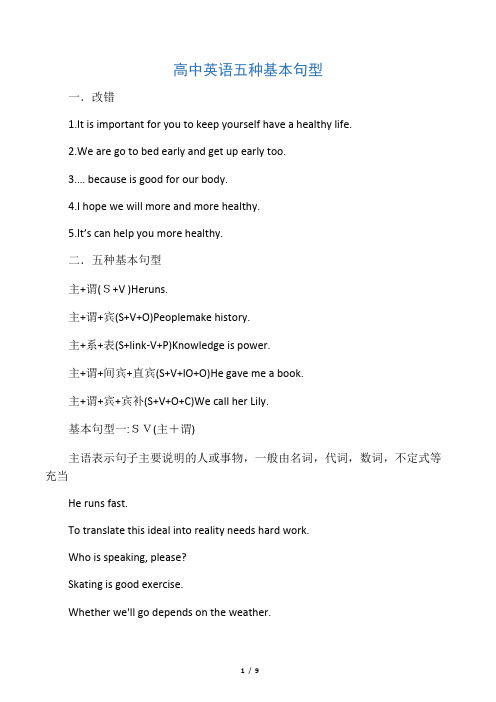
高中英语五种基本句型一.改错1.It is important for you to keep yourself have a healthy life.2.We are go to bed early and get up early too.3.… because is good for our body.4.I hope we will more and more healthy.5.It’s can help you more healthy.二.五种基本句型主+谓(S+V )Heruns.主+谓+宾(S+V+O)Peoplemake history.主+系+表(S+link-V+P)Knowledge is power.主+谓+间宾+直宾(S+V+IO+O)He gave me a book.主+谓+宾+宾补(S+V+O+C)We call her Lily.基本句型一:SV(主+谓)主语表示句子主要说明的人或事物,一般由名词,代词,数词,不定式等充当He runs fast.To translate this ideal into reality needs hard work.Who is speaking, please?Skating is good exercise.Whether we'll go depends on the weather.Two-thirds of the workers are women.谓语说明主语的动作,状态或特征只有动词才可以充当谓语。
Some children asked for cold drinks.I shall go to see him tomorrow.I must ask her to teach me to swim.I made your birthday cake last night.What does this word mean?I won’t do it again.S│V(不及物动词)1. The sun│rose.2. Who│cares?3. What he said│does not matter.4. Th ey│talked for half an hour.5. The pen│writes smoothly.共同特点:谓语动词都能表达完整的意思。
英语五种基本句型与练习试题

语法体系分不清?没关系,只要是英语的句子,都必须符合五种句型。
所以当我们再遇到长难句,不管多长,多复杂,咱都不怕,找出主干就能识别句子大意啦。
我们接下来好好学习一下五种基本句型吧~(一)英语五种基本句型基本句型一: 主+系+表此句型的句子有一个共同的特点:句子谓语动词都不能表达一个完整的意思,必须加上一个名词或者形容词,才能表达完整的意思.系动词分两类:be, look, keep, seem等属一类;get, grow, become, turn等属另一类,表示变化.be 本身没有什么意义,只起连系主语和表语的作用.其它系动词仍保持其部分词义.1. This is an English-Chinese dictionary. 这是本英汉辞典.2. The dinner smells good. 午餐的味道很好.3. His face turned red. 他的脸红了4. Everything looks different. 一切看来都不同了.基本句型二: 主+谓(不及物动词)此句型的句子有一个共同特点,即句子的谓语动词都能表达完整的意思.这类动词叫做不及物动词,后面可以跟副词,介词短语,状语从句等.1. The pen writes smoothly. 这支笔书写流利.2. The sun rises in the east.太阳从东方升起。
3. They talked for half an hour. 他们谈了半个小时.基本句型三: 主+谓(及物)+宾此句型句子的共同特点是:谓语动词都具有实义,都是主语产生的动作,但不能表达完整的意思,必须跟有一个宾语,即动作的承受者,才能使意思完整.这类动词叫做及物动词.1. Who knows the answer?谁知道答案?2. He enjoys reading. 他喜欢看书.3. My sister is writing a letter at this moment. 我妹妹此刻正在写一封信。
(完整版)1五种基本句型讲解与练习

句子的基本句型由主语、谓语动词、表语、宾语、宾语补足语等句子成分,按不同方式可组合成五种基本句型。
句子成分的表示方法:S: Subject 主语;V: Verb 动词;O: Object 宾语;P: Predicative 表语;IO: In direct Object 间接宾语;DO:Direct Object 直接宾语OC: Object Complement 宾语补足语;◊第一种句型:主语+不及物动词(S+V)该句型所用动词都是不及物动词,其后当然不能接宾语,但是可以用状语修饰谓语动词或整个句子。
He runs fast in the street. 他在街上跑得飞快。
The meeting begins at nine. 会议九点开始。
◊第二种句型:主语+及物动词+宾语(S+V+DO)该句型所用动词都是及物动词,可作宾语的有名词、代词、不定式、动名词或短语及从句。
We attended the meeting. 我们出席了那次会议。
(名词作宾语)She stopped him. 她叫住了他。
(代词作宾语)She wants to ask a question. 她要问一个问题。
(不定式作宾语)They enjoy listening to the classic music. 他们喜欢听古典音乐。
(动名词作宾语)注意:一些不及物动词之后加上介词就可以具有及物动词的功能,其后就可以接宾语了。
这一类词组有:listen to 听;look at 看;look after 照看;look for 寻找;arrive at/in 到达等。
May I turn on the light? 我可以开灯吗?What are you looking for? 你在找什么?◊第三种句型:主语+连系动词+表语(S+V+P)连系动词的后面必须接表语,说明主语的情况和状态。
通常可作表语的是名词或形容词。
She became a lawyer last year. 去年,她成为了一名律师。
高中英语英语五种基本句型及练习
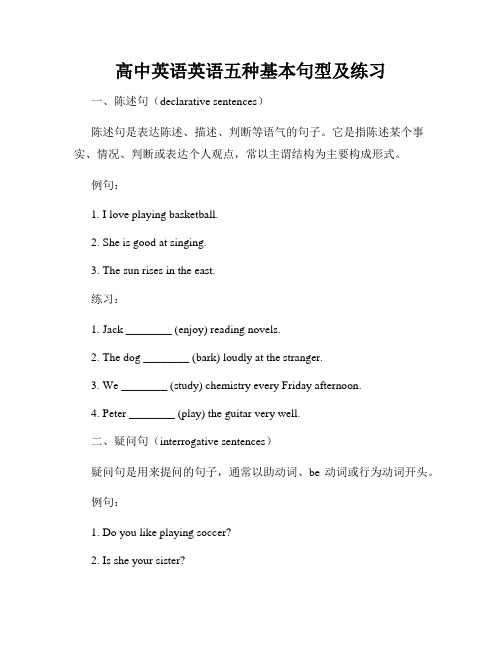
高中英语英语五种基本句型及练习一、陈述句(declarative sentences)陈述句是表达陈述、描述、判断等语气的句子。
它是指陈述某个事实、情况、判断或表达个人观点,常以主谓结构为主要构成形式。
例句:1. I love playing basketball.2. She is good at singing.3. The sun rises in the east.练习:1. Jack ________ (enjoy) reading novels.2. The dog ________ (bark) loudly at the stranger.3. We ________ (study) chemistry every Friday afternoon.4. Peter ________ (play) the guitar very well.二、疑问句(interrogative sentences)疑问句是用来提问的句子,通常以助动词、be动词或行为动词开头。
例句:1. Do you like playing soccer?2. Is she your sister?3. Where is the nearest supermarket?练习:1. ________ you watch TV last night?2. ________ the weather like today?3. ________ Tim have a new car?三、祈使句(imperative sentences)祈使句是用来表达命令、请求、建议等意思的句子。
它通常以动词原形开头。
例句:1. Please close the door.2. Study hard for the exam.3. Let's go for a walk.练习:1. ________ your homework before going to bed.2. ________ your parents for permission before going out.3. ________ up early tomorrow.四、感叹句(exclamatory sentences)感叹句用来表达强烈的感情、惊奇、赞美、喜悦等。
简单句五种基本句型及练习,there be 结构
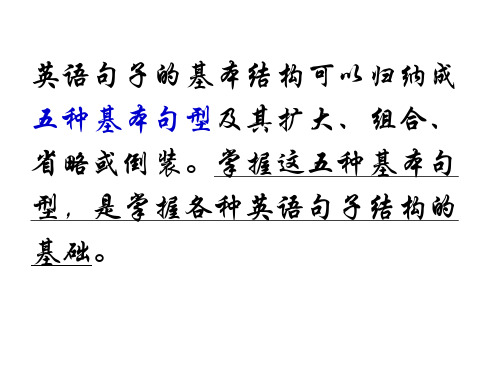
此句型中的谓语动词是及物动词,必须跟一个宾语, 才能使意思完整,而宾语成分的多样化使这一结构异 常复杂。
主谓宾结构
• 昨晚我写了一封信。 • I wrote a letter last night. • 今天下午我想同你谈谈。 • I want to talk with you this afternoon. • 他们成功地完成了计划。 • They have carried out the plan successfully. • 你们必须在两周内看完这些书。 • You must finish reading these books in two weeks. • 那位先生能流利地说三种语言。 • That gentleman can speak three languages fluently.
There be 句型
• 这个村子过去只有一口井。 • 恰好那时房里没人。 • 从前,在海边的一个村子里住着一位老渔 夫。 • 在这个山洞前面长着一棵高大的树。 • 二月份有二十八天。
There be 句型
• 这个村子过去只有一口井。 • There was only a well in the village. • 恰好那时房里没人。 • There happened to be nobody in the room. • 从前,在海边的一个村子里住着一位老渔夫。 • Once, there lived an old fisherman in a village by the sea. • 在这个山洞前面长着一棵高大的树。 • In front of the cave, there stands /grows a tall tree. • 二月份有二十八天。 • There are twenty-eight days in February.
英语五大基本句型详解和练习[配解析]
![英语五大基本句型详解和练习[配解析]](https://img.taocdn.com/s3/m/20d066915acfa1c7ab00cc89.png)
2012 届高三英语五种简单句(一)从英语的句子构造上说,除了修饰名词的定语和修饰动词的状语外,在千变万化的句子中可概括为五个基本句式,一般地说,某些动词在某一句式中,下边我们把这些句型和常用的动词进行归类,供大家参照。
一、S(主) + Vi (不及物动词)(谓)Time (s) + flies (Vi)两天过去了。
冬季快要来了。
受伤的猫死了。
发生了一宗交通事故。
1) S + Vi + adverbial (副词作状语)Birds sing beautifully.他快乐地走开了。
女孩寂静地走了进来。
战争和平川结束了。
雨逐渐地停了。
2)S + Vi + Prep phase (介词短语作状语)He went on holiday.他们会在三点钟到。
那群孩子步行去上学。
3)S + Vi +Infinitive (不定式作状语)We stopped to have a rest.他起得早是为了读英语。
他希望做医生。
4)S + Vi +Participle (此刻分词作状语)I will go swimming.我们明日一同去垂钓。
我明日去划船。
昨天他们去逛街。
2012届高三英语五种简单句(二)1)S(主) + Vt(及物动词)(谓)+ Object (------- We like English.S + Vt + N/ Pron (名词或代词作宾语)I like music. / I like her.宾)他昨年教数学。
我们已收到了他们的来信。
2)S + Vt + Infinitive (不定式作宾语)I want to help him.他爸爸期望拥有一家工厂。
他们假装在看书。
我试试去解决那个问题。
常用于这个句型的动词有: attempt ,dare ,decide, desire, expect, hope, wish,intend, learn, need, offer, pretend, promise, propose, refuse, want, manage,plan, fail, try, agree等。
英语五种基本句型及练习
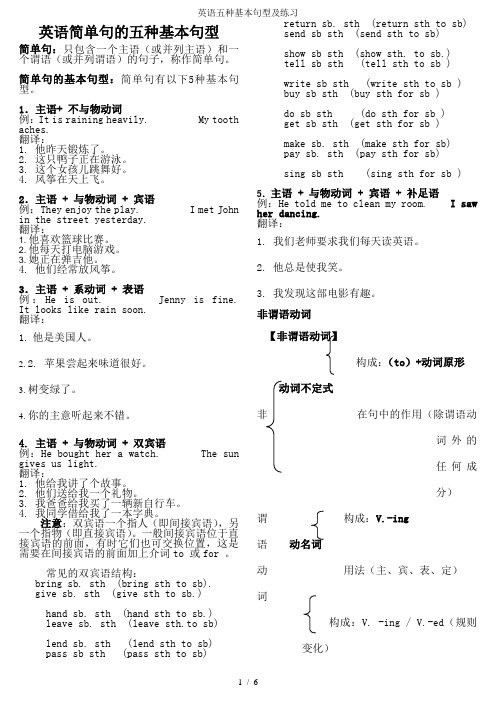
英语简单句的五种基本句型简单句:只包含一个主语(或并列主语)和一个谓语(或并列谓语)的句子,称作简单句。
简单句的基本句型:简单句有以下5种基本句型。
1.主语+ 不与物动词 例:It is raining heavily. My tooth aches. 翻译:1. 他昨天锻炼了。
2. 这只鸭子正在游泳。
3. 这个女孩儿跳舞好。
4. 风筝在天上飞。
2.主语 + 与物动词 + 宾语 例:They enjoy the play. I met John in the street yesterday. 翻译:1. 他喜欢篮球比赛。
2. 他每天打电脑游戏。
3. 她正在弹吉他。
4. 他们经常放风筝。
3.主语 + 系动词 + 表语例:He is out. Jenny is fine. It looks like rain soon.翻译:1. 他是美国人。
2. 2. 苹果尝起来味道很好。
3. 树变绿了。
4. 你的主意听起来不错。
4. 主语 + 与物动词 + 双宾语例:He bought her a watch. The sun gives us light. 翻译:1. 他给我讲了个故事。
2. 他们送给我一个礼物。
3. 我爸爸给我买了一辆新自行车。
4. 我同学借给我了一本字典。
注意:双宾语一个指人(即间接宾语),另一个指物(即直接宾语)。
一般间接宾语位于直接宾语的前面,有时它们也可交换位置,这是需要在间接宾语的前面加上介词to 或for 。
常见的双宾语结构:bring sb. sth (bring sth to sb). give sb. sth (give sth to sb.)hand sb. sth (hand sth to sb.) leave sb. sth (leave sth.to sb) lend sb. sth (lend sth to sb) pass sb sth (pass sth to sb)return sb. sth (return sth to sb) send sb sth (send sth to sb)show sb sth (show sth. to sb.)tell sb sth (tell sth to sb ) write sb sth (write sth to sb ) buy sb sth (buy sth for sb ) do sb sth (do sth for sb ) get sb sth (get sth for sb ) make sb. sth (make sth for sb) pay sb. sth (pay sth for sb)sing sb sth (sing sth for sb )5.主语 + 与物动词 + 宾语 + 补足语例:He told me to clean my room. I saw her dancing. 翻译:1. 我们老师要求我们每天读英语。
高考英语 简单句五种基本句型讲与练素材.doc

简单句五种基本句型讲与练五种基本句型:1. 主语 + 系 (link-v.) + 表语2. 主语 + 谓语 (vi.) (+状语)3. 主语 + 谓语 (vt.) + 宾语4. 主语 + 谓语 (vt.) + 间接宾语 + 直接宾语5. 主语 + 谓语 (vt.) + 宾语 + 宾语补足语I.主语 + 系 (link-v.) + 表语连系动词●"存在"类:表示存在或具有某种特征或状态.这类连系动词强调"存在"。
常见的有:be(是), _________(看起来), __________(摸上去), ____________(闻起来),_______________(尝起来), _______________(听起来) __________(似乎是),____________(似乎、显得),____________(证明是),等。
●"持续"类:表示某种情况或状态的持续。
这类连系动词强调"持续"。
常见的有:remain(依然),keep(保持),stay(保持), stand(处于某状况或情形)等●"变化"类:表示由一种情况或状态变化成另一种情况或状态。
这类连系动词强调"变化"后的情况或状态.常见的有:become(变成), turn(变成), grow(变得),go(变得)等。
1.他感到焦虑。
He ___________ worried.2.这孩子看起来像只猴子。
The child _________ like a monkey.3.你必须保持健康。
You must ________ ____________.4.这种混合物味道太难尝了。
The mixture ________ __________.5.我觉得听起来不错。
________ _________ to me.6. 他变得对科学感兴趣。
高一英语五种基本句型及巩固练习
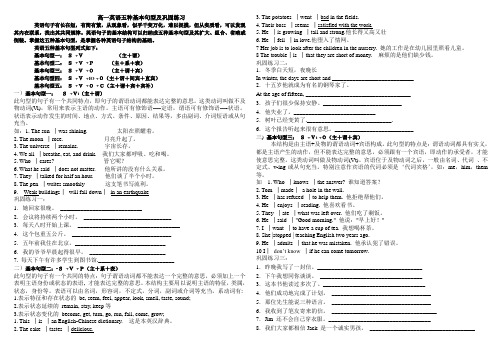
高一英语五种基本句型及巩固练习英语句子有长在短,有简有繁,从现象看,似乎千变万化,难以捉摸,但从实质看,可以发现其内在联系,找出其共同规律。
英语句子的基本结构可以归纳成五种基本句型及其扩大、组合、省略或倒装。
掌握这五种基本句型,是掌握各种英语句子结构的基础。
英语五种基本句型列式如下:基本句型一:S+V(主+谓)基本句型二:S+V+P(主+系+表)基本句型三:S+V+O(主+谓+宾)基本句型四:S+V+IO +O(主+谓+间宾+直宾)基本句型五:S+V+O+C(主+谓+宾+宾补)一)基本句型一:S+Vi(主+谓)此句型的句子有一个共同特点,即句子的谓语动词都能表达完整的意思。
这类动词叫做不及物动词(Vi),常用来表示主语的动作。
主语可有修饰语----定语,谓语可有修饰语----状语。
状语表示动作发生的时间、地点、方式、条件、原因、结果等,多由副词、介词短语或从句充当。
如:1. The sun │was shining. 太阳在照耀着。
2. The moon │rose. 月亮升起了。
3. The universe │remains. 宇宙长存。
4. We all │breathe, eat, and drink. 我们大家都呼吸、吃和喝。
5. Who │cares? 管它呢?6. What he said │does not matter. 他所讲的没有什么关系。
7. They │talked for half an hour. 他们谈了半个小时。
8. The pen │writes smoothly 这支笔书写流利。
9. Weak buildings│will fall down│in an earthquake巩固练习一:1.她回家很晚。
____________________________2.会议将持续两个小时。
______________________________3.每天八时开始上课。
英语五种基本句型及练习(有用)
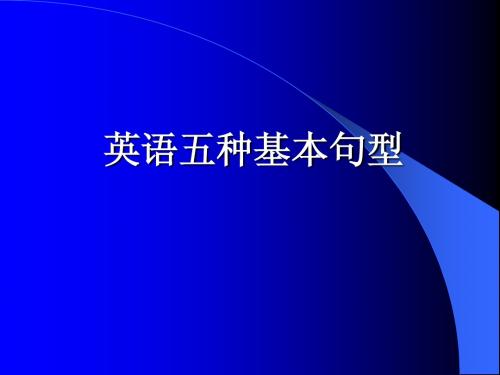
I.
接名词作宾语补足语的动词 常见的有call, name, think, make,find,elect,consider等。 如: We call them mooncakes. They consider Jack a brave boy.
II. 接形容词作宾语补足语的动 词常见的有make, keep, think, find,consider,like等。如: At first I found Chinese hard. We must keep the classroom clean.
III. 动词不定式作宾语补足语时通 常分为下面三种情况:
I)接带to的动词不定式作宾语补足
语的动词常见的有tell, want, ask, wish, teach等。如: Tell him to come here the day after tomorrow. 告诉他后天到这里来。
II)接不带to的动词不定式作宾语补 足语的动词常见的有hear, see, watch, let, make等。如: He made us laugh. III)接带to或不带to的动词不定式作 宾语补足语的动词常见的是help。如: She often helps her mother(to) do some housework.
常见的可以接双宾语的动词有
tell(告诉某人……),
tell sb sth (tell
sth to sb) send(送给某人……), send sb sth (send sth to sb) give(给某人……), give sb sth (give sth to sb) bring(带给某人……), bring sb sth (bring sth to sb)
(完整版)英语五大基本句型及练习

(完整版)英语五大基本句型及练习英语五大基本句型及练习英语五大基本句型及练习基本概念:与汉语相似,英语句子是由主语(subject), 谓语动词(verb),宾语(object), 表语(predicative),状语(adverbial),宾语补足语(object complement)等成分组成,按照这些成分的组合方式英语句子可分为五种基本句型。
句型一:主语+不及物动词不及物动词本身就可以表达完整的意念,不需要宾语及补语,但有时可有副词,介词短语等状语修饰语。
e.g. The rain stopped .The old man walks in the park .句型一的扩展:1.主语+不及物动词+状语e.g. The machine works smoothly. (机器运转正常。
)2.There +不及物动词+主语e.g. There is some milk in the bottle .There comes the bus .3. 主语+不及物动词+ 动词不定式e.g. They stopped to take a short rest . (他们停下来稍作休息)特别提醒动词stop 可用作不及物动词,也可用作及物动词。
作不及物动词时, 通常后接动词不定式,表示停下来的目的是做另一件事。
作及物动词时,通常后接动名词,表示停止做这件事。
e.g. They stopped taking a rest .句型二:主语+系动词+表语系动词本身不能表达完整的意念没,需要形容词,名词,介词短语等来补充说明主语,也叫主语补语。
e.g. My sister is a nurse .I feel quite hungry .The ball is under the desk .句型三:主语+及物动词+宾语及物动词本身需要一个动作的接受者(宾语),才可以表达一个完整的意念。
e.g. We are learning English .Do you know him ?Your radio needs repairing .She hopes to see her uncle.句型四:主语+及物动词+间接宾语+直接宾语有些及物动词需要两个宾语才能表达一个完整意念。
英语五种基本句型详解及专练

英语五种基本句型详解及专练(最新版)编制人:__________________审核人:__________________审批人:__________________编制单位:__________________编制时间:____年____月____日序言下载提示:该文档是本店铺精心编制而成的,希望大家下载后,能够帮助大家解决实际问题。
文档下载后可定制修改,请根据实际需要进行调整和使用,谢谢!并且,本店铺为大家提供各种类型的经典范文,如词性大全、句法大全、句型大全、从句大全、时态大全、语态大全、语法大全、虚拟语气、用法辨析、其他资料等等,想了解不同范文格式和写法,敬请关注!Download tips: This document is carefully compiled by this editor.I hope that after you download it, it can help you solve practical problems. The document can be customized and modified after downloading, please adjust and use it according to actual needs, thank you!In addition, this shop provides you with various types of classic sample essays, such as part of speech, syntax, sentence pattern, clause, tense, voice, grammar, subjunctive, usage analysis, other materials, etc. If you want to know the different formats and writing methods of the model essay, please pay attention!英语五种基本句型详解及专练句子由主语和谓语两大部分组成。
高考英语简单句的五种基本句型讲解及练习题

简单句的五种基本句型讲解及练习题一、句子成份英语句子成分有主语,谓语,宾语,宾语补足语,表语,定语,状语等。
顺序一般是主语,谓语,宾语,宾语补足语,而表语,定语,状语的位置要根据情况而定。
1、主语:表示句子主要说明的人或事物,一般位于句首。
但在there be结构、疑问句(当主语不疑问词时)和倒装句中,主语位于谓语、助动词或情态动词后面。
主语可由名词、代词、数词、不定式、动名词、名词化的形容词和主语从句等表示。
例如:Country music has become more and more popular.(名词)We often speak English in class.(代词)One-third of the students in this class are girls.(数词)To swim in the river is a great pleasure.(不定式)Smoking does harm to the health.(动名词)The rich should help the poor.(名词化的形容词)What we are going to do has not been decided.(主语从句)It is necessary to master a foreign language.(it作形式主语,真正的主语为后面的不定式)2、谓语:谓语说明主语的动作,状态或特征。
可以有不同的时态,语态和语气。
1)简单谓语:We study for the people.2)复合谓语:I can speak a little English. We are reading books. He has gone to Beijing..3、表语: 它位于系动词(比如be)之后,说明主语身份,特征,属性或状态。
My sister is a nurse.Is it yours?(代词)The weather has turned cold.(形容词)The speech is exciting.(分词)Three times seven is twenty one?(数词)His job is to teach English.(不定式)His hobby(爱好)is playing football.(动名词)The ruler must be in your box.(介词短语)Time is up. The class is over.(副词)The truth is that he has never been abroad.(表语从句)4、宾语: 宾语表示动作行为的对象,跟在及物动词之后,We like English.How many dictionaries do you have? I have five.(数词)They helped the old with their housework yesterday.(名词化形容词)It began to rain.(不定式短语)I enjoy listening to popular music.(动名词短语)I think(that)he is fit for his office.(宾语从句)有些及物动词可以带两个宾语,往往一个指人,一个指物,指人的叫间接宾语,指物的叫直接宾语。
(完整版)英语五大基本句型及练习

英语五大基本句型及练习英语五大基本句型及练习基本概念:与汉语相似,英语句子是由主语(subject), 谓语动词(verb),宾语(object), 表语(predicative),状语(adverbial),宾语补足语(object complement)等成分组成,按照这些成分的组合方式英语句子可分为五种基本句型。
句型一:主语+不及物动词不及物动词本身就可以表达完整的意念,不需要宾语及补语,但有时可有副词,介词短语等状语修饰语。
e.g. The rain stopped .The old man walks in the park .句型一的扩展:1.主语+不及物动词+状语e.g. The machine works smoothly. (机器运转正常。
)2.There +不及物动词+主语e.g. There is some milk in the bottle .There comes the bus .3. 主语+不及物动词+ 动词不定式e.g. They stopped to take a short rest . (他们停下来稍作休息)特别提醒动词stop 可用作不及物动词,也可用作及物动词。
作不及物动词时, 通常后接动词不定式,表示停下来的目的是做另一件事。
作及物动词时,通常后接动名词,表示停止做这件事。
e.g. They stopped taking a rest .句型二:主语+系动词+表语系动词本身不能表达完整的意念没,需要形容词,名词,介词短语等来补充说明主语,也叫主语补语。
e.g. My sister is a nurse .I feel quite hungry .The ball is under the desk .句型三:主语+及物动词+宾语及物动词本身需要一个动作的接受者(宾语),才可以表达一个完整的意念。
e.g. We are learning English .Do you know him ?Your radio needs repairing .She hopes to see her uncle.句型四:主语+及物动词+间接宾语+直接宾语有些及物动词需要两个宾语才能表达一个完整意念。
高中英语 简单句的五种基本句型讲解及练习题
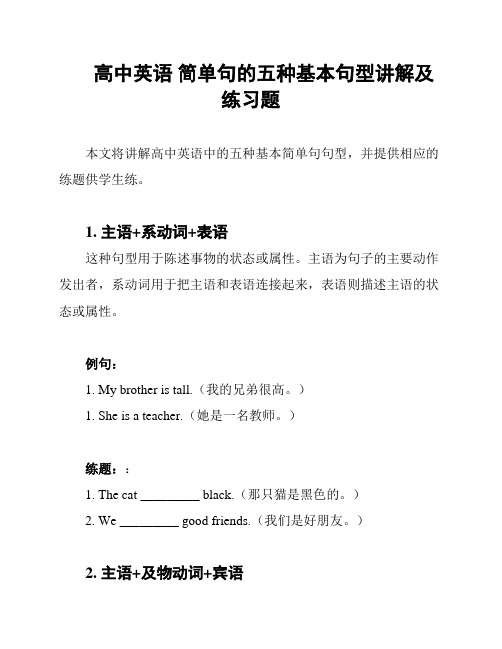
高中英语简单句的五种基本句型讲解及练习题本文将讲解高中英语中的五种基本简单句句型,并提供相应的练题供学生练。
1. 主语+系动词+表语这种句型用于陈述事物的状态或属性。
主语为句子的主要动作发出者,系动词用于把主语和表语连接起来,表语则描述主语的状态或属性。
例句:1. My brother is tall.(我的兄弟很高。
)1. She is a teacher.(她是一名教师。
)练题::1. The cat _________ black.(那只猫是黑色的。
)2. We _________ good friends.(我们是好朋友。
)2. 主语+及物动词+宾语这种句型用于表达主语对宾语进行的动作。
主语是动作的发起者,而宾语是动作的承受者。
例句:1. They read books.(他们读书。
)2. She eats an apple.(她吃了一个苹果。
)练题::1. He plays _________ every day.(他每天打篮球。
)2. We visited _________ yesterday.(我们昨天拜访了一位老师。
)3. 主语+及物动词+间接宾语+直接宾语这种句型用于表达主语把事物或信息传递给间接宾语,并对直接宾语进行的动作。
例句:1. She gave me a gift.(她给了我一个礼物。
)练题::1. He bought _________ a new phone.(他给我买了一部新手机。
)2. My mother cooked _________ a delicious meal.(我妈妈给我煮了一顿美味的饭菜。
)4. 主语+及物动词+宾语+宾语补足语这种句型用于表达主语使宾语处于某种状态。
例句:1. They made him happy.(他们让他快乐。
)练题::1. The music made her _________.(那音乐让她难过。
)2. The teacher found the answer _________.(老师发现了答案正确。
英语五大基本句型及习题
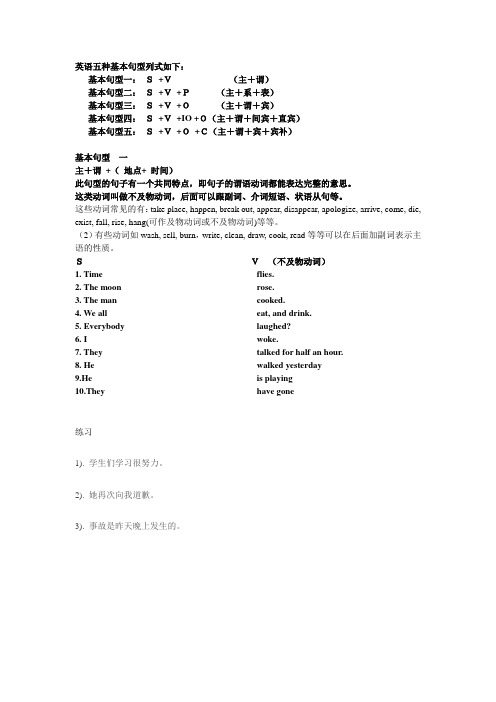
英语五种基本句型列式如下:基本句型一:S+V(主+谓)基本句型二:S+V+P(主+系+表)基本句型三:S+V+O(主+谓+宾)基本句型四:S+V+IO +O(主+谓+间宾+直宾)基本句型五:S+V+O+C(主+谓+宾+宾补)基本句型一主+谓+(地点+ 时间)此句型的句子有一个共同特点,即句子的谓语动词都能表达完整的意思。
这类动词叫做不及物动词,后面可以跟副词、介词短语、状语从句等。
这些动词常见的有:take place, happen, break out, appear, disappear, apologize, arrive, come, die, exist, fall, rise, hang(可作及物动词或不及物动词)等等。
(2)有些动词如wash, sell, burn,write, clean, draw, cook, read等等可以在后面加副词表示主语的性质。
SV(不及物动词)1. Time2. The moon3. The man4. We all5. Everybody6. I7. They8. He9.He10.They flies.rose.cooked.eat, and drink. laughed?woke.talked for half an hour. walked yesterdayis playinghave gone练习1). 学生们学习很努力。
_____________________________________2). 她再次向我道歉。
_______________________________________3). 事故是昨天晚上发生的。
_____________________________________基本句型二主+系+表+(地点+ 时间)此句型的句子有一个共同的特点:句子谓语动词都不能表达一个完整的意思,必须加上一个表明主语身份或状态的表语构成复合谓语,才能表达完整的意思。
高考英语 简单句的五种基本句型讲解及练习题

高考英语简单句的五种基本句型讲解及练习题引言本文将介绍高考英语中常见的五种基本句型,并提供相应的练题,以帮助学生更好地理解和掌握这些句型。
一、主谓句型主谓句型是英语中最基础、最常见的句型之一。
它由一个主语和一个谓语组成。
主语一般代表句子中的主要人或物,而谓语则表示主语的状态、动作或行为。
以下为一个例句:例句:Tom studies English every day.练题:1. She ____________ to school by bus.2. The cat ____________ on the tree.3. We ____________ a party last night.二、主谓宾句型主谓宾句型在主谓句型的基础上增加了一个宾语,表示动作的承受者或影响的对象。
宾语一般位于谓语动词后面。
以下为一个例句:例句:I love flowers.练题:1. They played ____________ in the park.2. She bought a new ____________.3. We visited ____________ during the summer vacation.三、主系表句型主系表句型由一个主语、一个系动词和一个表语组成。
系动词用于连接主语和表语,表达主语的状态、性质或特征。
以下为一个例句:例句:Her brother is a doctor.练题:1. The weather ____________ nice today.2. My sister ____________ a teacher.3. The cake ____________ delicious.四、There be 句型There be 句型用于表示某地存在某人或某物。
它的基本形式为"There be + 句子的主语 + 句子的其他部分"。
以下为一个例句:例句:There is a book on the table.练题:1. ____________ many students in the classroom.2. ____________ a pen and a pencil on the desk.3. ____________ a cat in the garden.五、疑问句型疑问句型用于提问,通常使用特殊疑问词来引导疑问句。
高中英语5种基本句型

S } have kept me spellbound. ) _________ O OC V
____________________________ birds, moonlight and flowers could never ___________
英语简单句五种基本句型 B:九种句子成分
一、句子成分
(不定式)
5.Smoking does harm to the health. (动名词) 6.The rich should help the poor.
(名词化的形容词)
7.When we are going to have an English test has not been decided. (主语从句) 8.It is necessary to master a foreign language.
构成句子的各个部分叫做句子成分。
句子成分有主要成分和次要成分;
1.主要成分有主语和谓语;
2.次要成分有表语、宾语、定语、状语、补足语 和同位语。
句子成分详解表
句子成分 主语 意义 表示句子说的是什么人或什么 事 说明主语做什么,是什么或怎 么样 表示动作行为的对象 与联系动词连用,一起构成谓 语,说明主语的性质或特征 用来修饰名词或代词 修饰动词,形容词,副词,表 示动作发生的时间,地点,原 因,目的,方式,结果等 逻辑上与宾语是主谓关系 充当词类 名,代,数,不定 式,动名词,短语或 句子 动词或动词词组 同主语 同主语 形,代,数,名, 副,介词短语或句子 副词,介词短语或句 子 形容词,名词,介词 短语等 例句 We study in HuangQiao Middle School. She is dancing under the tree. Both of us like English. Her father is a chemist. His words sound reasonable. We have eight lessons every day. He works very hard. They held a party in Hollywood. She always keeps the house clean.
英语五种基本句型详解(有例句分析和习题练习)
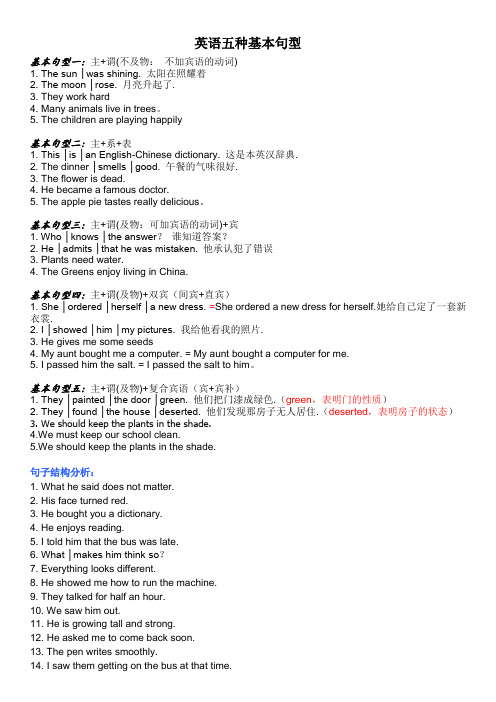
英语五种基本句型基本句型一:主+谓(不及物:不加宾语的动词)1. The sun │was shining. 太阳在照耀着2. The moon │rose. 月亮升起了.3. They work hard4. Many animals live in trees。
5. The children are playing happily基本句型二:主+系+表1. This │is │an English-Chinese dictionary. 这是本英汉辞典.2. The dinne r │smells │good. 午餐的气味很好.3. The flower is dead.4. He became a famous doctor.5. The apple pie tastes really delicious。
基本句型三:主+谓(及物:可加宾语的动词)+宾1. Who │knows │the answer?谁知道答案?2. He │admits │that he was mistaken. 他承认犯了错误3. Plants need water.4. The Greens enjoy living in China.基本句型四:主+谓(及物)+双宾(间宾+直宾)1. She │ordered │herself │a new dress. =She ordered a new dress for herself.她给自己定了一套新衣裳.2. I │showed │him │my pictures. 我给他看我的照片.3. He gives me some seeds4. My aunt bought me a computer. = My aunt bought a computer for me.5. I passed him the salt. = I passed the salt to him。
- 1、下载文档前请自行甄别文档内容的完整性,平台不提供额外的编辑、内容补充、找答案等附加服务。
- 2、"仅部分预览"的文档,不可在线预览部分如存在完整性等问题,可反馈申请退款(可完整预览的文档不适用该条件!)。
- 3、如文档侵犯您的权益,请联系客服反馈,我们会尽快为您处理(人工客服工作时间:9:00-18:30)。
英语五大基本句型及练习基本概念:与汉语相似,英语句子是由主语(subject), 谓语动词(verb),宾语(object), 表语(predicative),状语(adverbial),宾语补足语(object complement)等成分组成,按照这些成分的组合方式英语句子可分为五种基本句型。
句型一:主语+不及物动词不及物动词本身就可以表达完整的意念,不需要宾语及补语,但有时可有副词,介词短语等状语修饰语。
e.g. The rain stopped .The old man walks in the park .句型一的扩展:1.主语+不及物动词+状语e.g. The machine works smoothly. (机器运转正常。
)2.There +不及物动词+主语e.g. There is some milk in the bottle .There comes the bus .3. 主语+不及物动词+ 动词不定式e.g. They stopped to take a short rest . (他们停下来稍作休息)特别提醒动词stop 可用作不及物动词,也可用作及物动词。
作不及物动词时, 通常后接动词不定式,表示停下来的目的是做另一件事。
作及物动词时,通常后接动名词,表示停止做这件事。
e.g. They stopped taking a rest .句型二:主语+系动词+表语系动词本身不能表达完整的意念没,需要形容词,名词,介词短语等来补充说明主语,也叫主语补语。
e.g. My sister is a nurse .I feel quite hungry .The ball is under the desk .句型三:主语+及物动词+宾语及物动词本身需要一个动作的接受者(宾语),才可以表达一个完整的意念。
e.g. We are learning English .Do you know him ?Your radio needs repairing .She hopes to see her uncle.句型四:主语+及物动词+间接宾语+直接宾语有些及物动词需要两个宾语才能表达一个完整意念。
e.g. Her mother bought her a skirt.Give me the book, please.特别提醒A. 在此句型中,通常是间接宾语(人)在前,直接宾语(物)在后,有时直接宾语和间接宾语可以对调,这时间接宾语前应加上适当的介词。
e.g. Her mother bought a skirt for her .Give the book to me , please .直接宾语与间接宾语对调时,间接宾语前加介词to的动词有:give(给), tell(告诉) , lend(借给) , sell(卖), teach(教) , send(寄给), write(写给), show(出示) , return(还给), bring(带给), pass(递给), leave(留给), offer(提供), hand(交给)间接宾语前加介词for的动词有:buy(买), choose(选择), get (弄到), make(做), order(订购), sing (唱歌), do (做), play(演奏)B. 如果直接宾语为人称代词那么必须把直接宾放在间接宾语前,且间接宾语前要加上适当的介词。
e.g. I handed it to our teacher .不能说:I handed our teacher it .C. 此句型变为被动语态时,可分为两种情况。
e.g. Her mother bought her a skirt .a. She was bought a skirt by her mother .b. A skirt was bought for her by her mother.句型五:主语+及物动词+宾语+宾语补足语及物动词本身需要一个宾语外,还需要一个名词,形容词,副词, 动词不定式,分词来补充说明宾语,才能表达一个完整的意念。
e.g. We elected Li Yang our monitor.The news made us sad.She saw the thief steal into the shop .The teacher asked me to answer the question .I found the man stealing the money .I found my money stolen .特别提醒A. 现在分词为宾语补足语时,宾语与现在分词之间是主动关系;过去分词为宾语补足语时,宾语与过去分词之间是被动关系。
B. 在let(让),make(使得),have(请,让,使得),see(看),hear(听到),watch(观看),feel(感觉到),listen to (倾听),look at (看到),notice(注意到)等动词后的宾语补足语如果为不定式,则省掉”to”,但变为被动语态时,则要带”to”.e.g. We hear her sing next door.She is heard to sing next door .C. 此句型变为被动语态时,只有一种情况。
e.g. They saw him steal the old man’s money.He was seen to steal the old man’s money .英语五大基本句型练习1.I am sorry to have kept you ____.a. waitb. to waitc. waitingd. waited2.She found her dog ___over by a car on the road.a. runb. ran d. to run d. running3. Rose is going to have her hair _____.a. dob. donec. didd. doing4. She felt somebody ___her.a. touchedb. touchesc. touchd. to touch5. She taught him _____speak English.a. howb. how could hec. how he couldd. how to6.He didn’t enjoy the play because he ____.a. was boringb. boredc. was boredd. boring7.I will make your dream ____.a. comes trueb. to come truec. coming trulyd. come true8.He warned ____home .a. us to not gob. us not to goc. we not god. us not go9. Canned food does not go ____.a. bed easilyb. badly easyc. bad easyd. badly easily10.The sad news kept her ___all the night.a. awakeb. wakenc. waked. to wake11.I think ____a bad habit to get up late .a. thatb. itc. thisd. its12.He found his money _____.a. stealb. stealingc. stolend. to steal13.Roses in bloom smell ____.a. sweetlyb. sweetc. sweetend. sweetness14.We must have the machine ____.a. to repairb. repairingc. repaird. repaired15.She was lying in the sofa ____a book.a. readingb. readc. to readd. to reading16.A television set will keep us ____of the news of the day.a. informb. to informc. informedd. informing17.The speaker found himself ____all alone.a. leftb. leavec. leavingd. to leave18.The speaker found himself ____.a. misunderstandb. misunderstandingc. misunderstoodd. to misunderstand19.-My watch is broken.–Why don’t you ___.a. take a repairer your watchb. take your watch a repairerc. take to a repairer itd. take it to a repairer20.I heard you went to the museum yesterday and couldn’t find ____the hotel.a. how to return tob. how you could go forc. the way back ford. the way back to21.Yesterday was my birthday. My mother ____.a. made a cake to meb. made a cake mec. made for me a caked. made me a cake22. The teacher ____John a good student.a. believesb. knowsc. suggestsd. considers23.It’s a fine day. Let’s go boating, ___?a. will web. don’t wec. won’t wed. shall we24.Don’t smoke in the classroom, ___?a. will youb. do youc. don’t youd. won’t you25.He seldom has lunch at home, ____he?a. hasb. hasn’tc. doesd. doesn’t26.We had to get up early, ___we?a. didn’tb. don’tc. hadd. did27.You had Tom do the job, ____you?a. didb. didn’tc. hadd. hadn’t28.Let us have another look, ____you?a. willb. wouldc. won’td. wouldn’t29.Nobody came, ___?a. didn’t heb. didn’t theyc. did hed. did they30.We ought to hand it in today, ____we?a. oughtn’tb. don’tc. shouldn’td. won’t31.We’d better wait for ten more minutes, ___?a. hadn’t web. don’t wec.d idn’t we d. wouldn’t we32. I’d like a sandwich, ____?a. would youb. do youc. couldn’t youd. don’t you33.This is the third time this week John has had to study late, ___?a. hasn’t heb. isn’t hec. hasn’t itd. isn’t it34.You and I did it together, ___?a. didn’t Ib. didn’t youc. did youd. didn’t we35.They should have completed it earlier, ____?a. should theyb. shouldn’t theyc. have theyd. haven’t they36. You may take it if you want to, ___?a. mayn’t youb. don’t youc. shouldn’t youd. won’t you37.You must have told Mr. Smith the secret, ___?a. mustn’t youb. must youc. haven’t youd. have you38.She disliked the skirt his father bought her, ___?a. did sheb. didn’t shec. was shed. wasn’t she39.Tom said he was not there then, ___?a. didn’t heb. did hec. wasn’t hed. was he40. I suppose he is honest , ___?a. don’t Ib. do I C. isn’t he d. is he41. I don’t think he is serious, ___?a. don’t Ib. do I C. isn’t he d. is he42.She’s finished the job, ____she ?a. doesn’tb. isn’tc. wasn’td. hasn’t43. –You aren’t a teacher, are you?a. Yes, I am notb. No, I amc. No, but I wasd. Yes,I wasn’t44.- ____is your sister?-She is a teacher in a middle school.a. Whob. Whatc. Whichd. Where45.-How are your parents?-_____.a. They are doctorsb. They like sweet foodc. They are fined. They are fifty46. -___will you get married to him. -In a month.a. How soonb. How longc. How oftend. How much47. There ____two films this week in our school.a. isb. havec. have beend. has48. There ____a lot of news about the fire on TV last night.a. wasb. hadc. wered. is49.There used to be a temple there, ____?a. usedn’t itb. used therec. didn’t itd. didn’t there50. There ___ a stream in front of our house.a. liesb. hasc. standd. lie。
